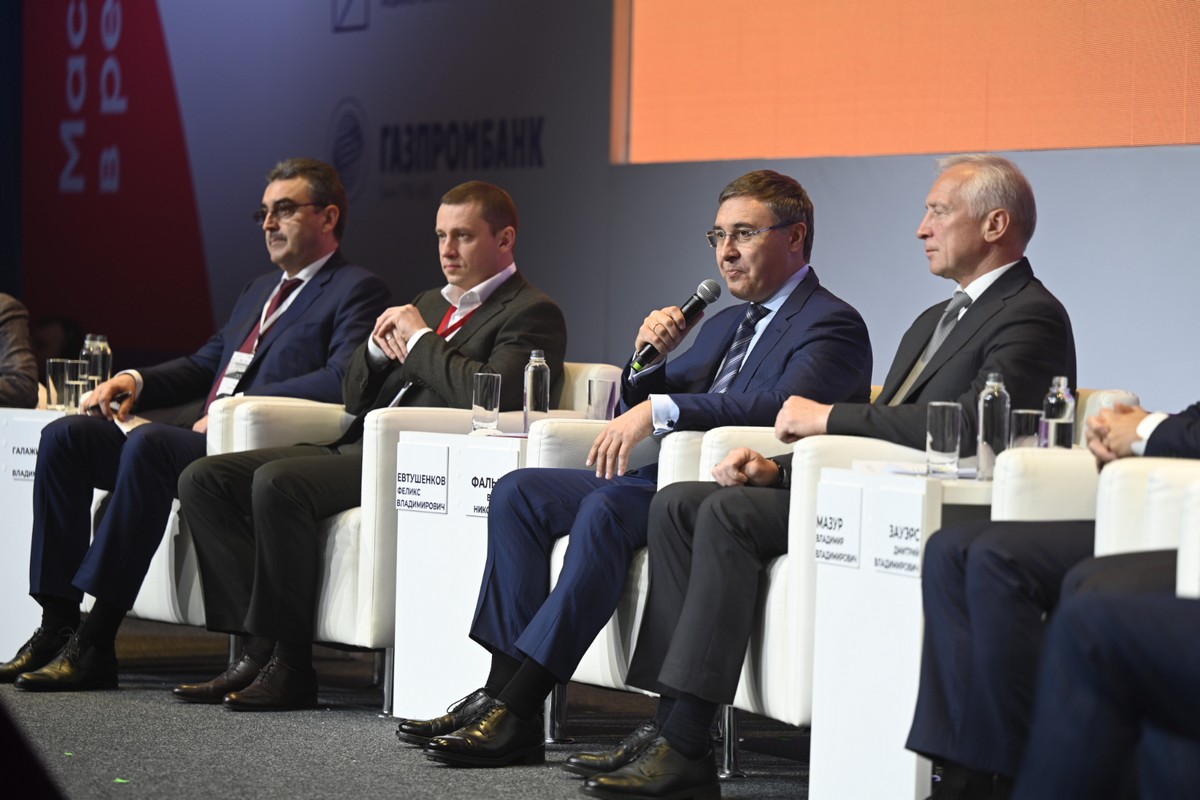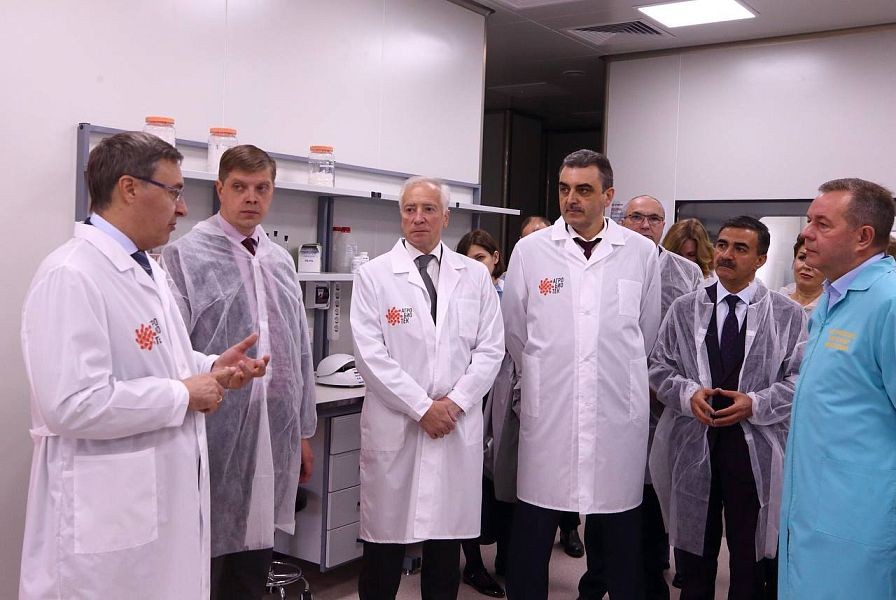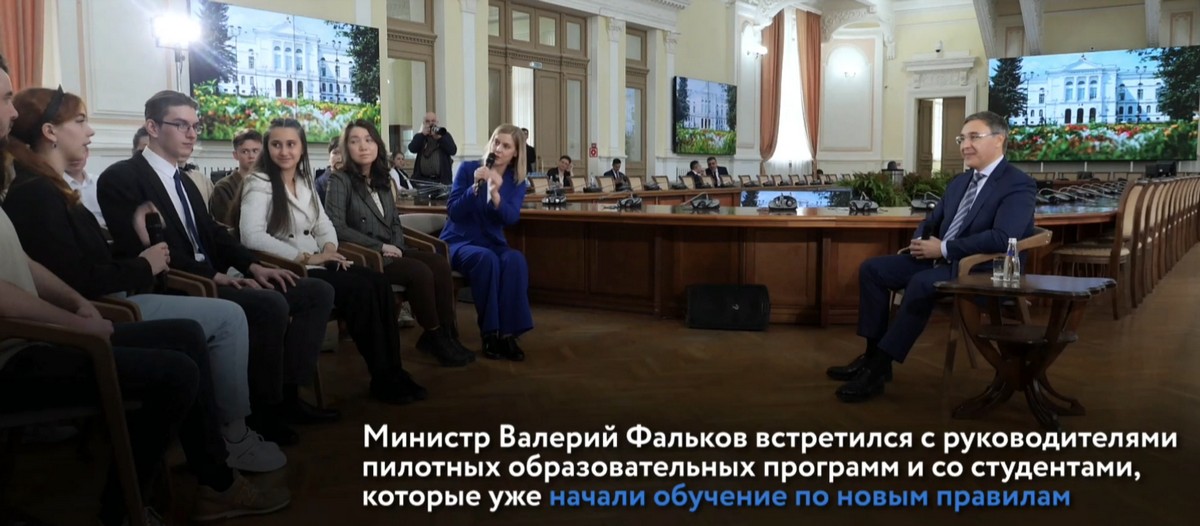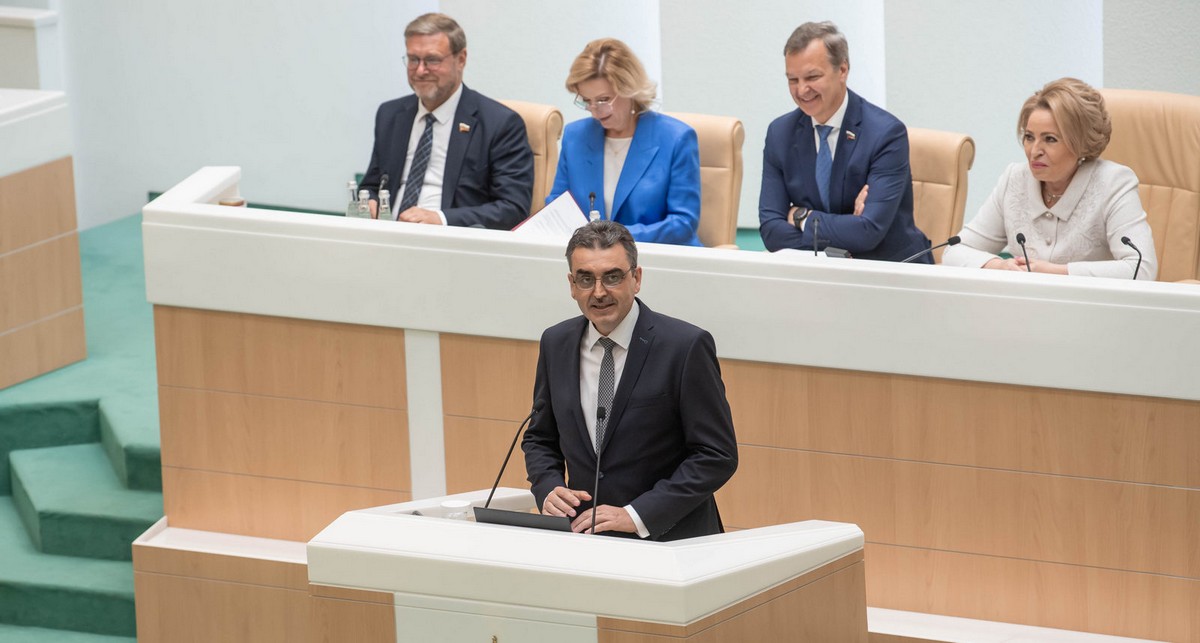This blog post analyzes the current stage of the renewal process in the Russian higher education system. TSU Rector Eduard Galazhinskiy discusses the main changes based on results presented at key events: meetings with Minister of Education and Science Valery Falkov, educational discussion panels at the St. Petersburg International Economic Forum, and a Federation Council meeting on higher education issues.
− Recently, there has been a series of events focused on summarizing the first year of improvements to the Russian higher education system. As noted, the official commencement was marked by the Decree of the President of the Russian Federation on May 12, 2023. As a direct participant in these events, you have first-hand knowledge of the results. Moreover, you served as both moderator and participant in the SPIEF-2024, and you spoke at the Federation Council. Please share your thoughts and impressions on that.
− The past year has been exceptionally intense for all six universities involved in the pilot project and for the Ministry of Education and Science. According to the presidential decree, essential changes to the Russian higher education system must be implemented simultaneously, swiftly, and seamlessly. At first glance, these demands may seem contradictory. However, if we interpret seamlessness as ensuring no violation of rights or deprivation of educational opportunities for those already trained or currently studying under the "old" Bologna programs, then such seamlessness can indeed coexist with tight timelines. Additionally, the decree emphasizes that the enhancement of the higher education system should consider the best practices developed throughout the history of domestic higher education. Thus, our Minister of Science and Higher Education, Valery Falkov, has repeatedly clarified over the past year that this endeavor is not a radical break fr om the past but rather a strategic "completion."
A series of events addressing the current state of Russian higher education, in which I participated, began with the All-Russian Forum of Young Scientists and Entrepreneurs, UNOVUS-2024. This forum took place in late May in Tomsk, with the theme "Development of Technological Entrepreneurship in the Student Environment." This theme was purposefully chosen, highlighting one of the significant trends in the higher education system that has held relevance for many years.

The forum attracted top officials fr om regional authorities and business sectors, along with industry experts. The Minister of Science and Higher Education participated in the plenary session, emphasizing that the technological advancement of Russia is inconceivable without the involvement of Russian universities. He also pointed out that representatives from large businesses attended not just as sponsors but as genuine partners eager to explore student startup projects and identify the best initiatives for financial support.
For the reference: Over the two years of implementing the "University Technology Entrepreneurship Platform" project, more than 23,000 university startups and projects have been created. This initiative involves over 360 universities from 81 regions of Russia, and the pool of external partners has significantly expanded to include large businesses, development institutions, and venture funds.
Significant events occurred directly on our university's campus. One notable event was the opening of the TSU Advanced Engineering School "Agrobiotech" Laboratory, attended by Minister Valery Falkov, Governor of the Tomsk Region Vladimir Mazur, management from the school's technological partner—Artlife company—and the heads of 17 scientific centers and agricultural universities. This laboratory is equipped with unique Russian technology, enabling students, alongside their mentors, to develop probiotics and milk starters. Additionally, the laboratory will host internships for students and teachers, including those from other universities, as part of network educational programs. The fact that the Minister later referenced the TSU Agrobiotech Laboratory as a model for scaling during a meeting of the Federation Council in Moscow indicates that our experience was well-regarded.

Moreover, the Minister held meetings with students and leaders of TSU's pilot educational programs, facilitating an exchange of views on the reasons behind the ongoing changes and addressing the challenges encountered during the implementation of the pilots initiated in 2023, as well as the development of new ones for 2024.
− Readers of this blog are undoubtedly eager to understand the reasons behind and the challenges faced in the first "pilot" year of changes in the domestic higher education system. Identifying these challenges is key to reflecting on the outcomes of this initial phase.
− Valery Falkov highlighted three primary reasons behind the "smooth revolution" happening in our higher education.
First, as with any system, contradictions build up over time, necessitating restructuring every 10 to 15 years. By 2022, both educators and employers had raised numerous questions about the current training periods and the competencies of graduates from the two-tier system.
Second, changing geopolitical conditions play a significant role. With our economy now operating under imposed sanctions, it's crucial to drive development through our own efforts, which requires a strong educational foundation closely linked to our economic system. Moreover, the requirements for graduates have become increasingly complex in this context.
The third, though less obvious, is the global shift to a new technological order, exemplified by advances in artificial intelligence. We need to understand how to organize education in a world wh ere human interaction with technology is intensifying.
Discussions with the heads of TSU's pilot programs raised various issues. These included defining the professional "core" of educational programs, allowing variability in training periods, and the concept of research masters. They also explored the feasibility of awarding students micro-qualifications before their main diploma, introducing new specialties, and other concerns. Valery Nikolaevich provided clear answers to some of these queries, drawing fr om the experiences of pilot universities over the past year, as well as insights from experts and employers across various fields. He later elaborated on these responses during a June plenary session of the Federation Council.
However, certain questions remain unresolved. Notably, how do we balance the foundational aspects of higher education with the practical training that employers expect from graduates? While a solid foundation enriches education, shaping individuals' worldviews and values, it doesn't always align with practical skills. To address this, President Vladimir Putin has instructed the Ministry of Education and Science to increase salaries and reduce the workload for teachers specializing in fundamental disciplines.The difference between postgraduate studies and research masters is not entirely clear. It was suggested that the presence of the latter would allow interested employers to hire its graduates for research positions without their having academic degrees, but with the necessary competencies. For example, in research laboratories that now exist in many innovative companies and at leading industrial and agricultural enterprises.
Formally, the issue of awarding students additional (or micro-) qualifications before issuing their main diploma remains unresolved. This change would allow students to become active participants in the labor market while still studying at university. Despite being a global practice, this approach hasn't been fully adopted here. While universities can issue their own certificates confirming necessary competencies, it would be more beneficial if these documents were coordinated with other state bodies and appropriately certified. This would provide legal protection for students who wish to work while still in school.

There is hope, however. The proposal to award additional qualifications, initiated by Russian pilot universities, including our own, has received clear support from the Ministry of Education and Science and several industry leaders. The Minister has promised to make the necessary decisions soon.
During discussions with the Minister at TSU, three main factors were highlighted as indicators of the pilot project's effectiveness. The first is the desire of other universities to follow the leading institutions participating in the development of pilot educational programs. The second is the demand for these programs from applicants. The third is the positive feedback from employers and industry leaders.
– Next on the calendar was a plenary meeting of the Federation Council, held at the same time as the annual St. Petersburg International Economic Forum, within which dozens of events were held that have some relevance to the changing Russian higher education system. You spoke both at the Federation Council and moderated one of the panel discussions at SPIEF-2024 Horizon 2030: Transition to a New Model of Higher Education. Please tell us about it.
− Let's start with the panel discussion, which essentially served as a synchronization check: rectors of leading Russian universities exchanged updates on the progress of their educational experiments. They addressed key questions like "Wh ere are we headed?", "Wh ere are we now?", and "What are our plans for the near future?" They shared ideas and proposals tested during the past academic year, which have proven their relevance and effectiveness.
For example, Alevtina Chernikova, Rector of MISiS, emphasized the necessity of involving potential employers (industry leaders) at every stage of developing, implementing, and evaluating pilot educational programs. She also shared an intriguing initiative: open defenses of graduation projects in the presence of industrial customers.
Mikhail Pogosyan, rector of MAI, spoke about new approaches to personnel training. He highlighted a shift in focus: rather than aligning Russian programs with those of Western European universities, the priority should be on training professionals to ensure our country's technological leadership. Consequently, MAI has decided to concentrate on training future complex engineers, as the product lifecycle has become central, rather than individual technological developments or services.
Alexei Lubkov, Rector of Moscow Pedagogical State University—a leader in domestic pedagogical education—quoted Pushkin, saying, "Russian bread will not be born in someone else's manner," to underscore the importance of the ongoing changes in domestic higher and school education. He also stressed the importance of fundamental training for future teachers, building on the best traditions of national education while remaining open to innovation. This principle is exemplified by combining the best pedagogical practices with the latest educational technologies, including artificial intelligence.
Marat Rudakov, Vice-Rector for Special Programs at St. Petersburg Mining University, highlighted key aspects of their transition to pilot programs. These include enhanced career guidance in schools across the country, including the Donetsk and Luhansk regions, with support fr om regional education departments; a complete shift away fr om the bachelor's degree to a six-year training program, wh ere the first two years focus on forming a professional "core" of higher technical education, and the final year involves a professional internship at the enterprise wh ere graduates will be employed.
Irina Filchenkova, Vice-Rector for Educational Activities at Immanuel Kant Baltic Federal University, stressed the importance of maintaining a dual focus: ensuring high-quality mass higher education while also managing talent. To achieve this, the university offers a range of educational events, technologies, and training formats, creating customized educational pathways that consider students' interests and abilities, as well as the needs of employers and industry development trends.
− What concerns do universities not participating in the pilot project have? What questions did their representatives raise?
− They are primarily interested in whether they will have the option to choose fr om the approaches developed at the six pilot universities or if they will be required to follow a single trajectory based on the best practices of these pilot institutions. My response was that one of the current critical tasks is to identify invariant tools and principles that will serve as the foundation for the national higher education system and can be applied across all universities in the country. Key principles emerging fr om this process include linking to the national qualification framework, revising the entire qualification matrix, and updating educational programs in collaboration with industry leaders and the National Labor Development Agency. This also involves defining the professional "core" of higher education programs. However, the search for these invariant principles will continue.
At the Federation Council, wh ere we convened with the rectors of MISiS and MAI, and wh ere Minister Valery Falkov delivered an extended report, senators questioned us about the specific outcomes of the first year of the experiment. When we discussed the problematic situations and questions that arose during the pilot phase, we were told that changes were taking too long and needed to be completed: new standards, technologies, and higher education formats should be implemented nationwide. This indicates an external demand for concrete administrative decisions, but internally, we recognize that the situation is complex and many questions remain unanswered.

In my speech at the Federation Council, I briefly outlined the results of the first year of the experiment at our university. Our main focus was on developing variable programs with flexible qualifications and training periods. The key question for us was: What exactly should determine the training periods? After discussions with professional communities and employer associations, we concluded that the only sensible basis is the national qualification framework. The primary criteria for qualifications, and thus training periods, are the complexity of the activity, its scientific intensity, and the level of responsibility involved.
The second crucial question is: Who will determine the requirements for the content of education? Our answer is industry leaders who are at the forefront of technological development and competitiveness. For TSU, such leaders are the Central Bank and Sberbank, which set the highest standards in the financial sector, currently undergoing rapid and dramatic changes due to digital technologies and artificial intelligence. Additionally, Gazprom Neft has become the industry leader for our university. Together with these partners, we are redefining their internal qualification content, determining the necessary training content, and launching pilot programs with the required learning outcomes. This is our approach.
− If we talk generally about the new model of domestic higher education, what does it look like today, especially considering each university in the experiment has its own vision?
− The overall outline of this new model has certainly become clearer. This was most evident in the nine main theses of the Minister of Education and Science's report at the Federation Council meeting. It is crucial that not only the teachers participating in the pilot but also those who will eventually work under the new model become familiar with these points.
Here are the contours of the new higher education model based on the first year of the experiment:
Complete Higher Education: The education received must be comprehensive and sufficient to meet economic needs. It should provide high-quality professional training without requiring further education in a master's program. This is a key objective of the planned transformations.
Variable Training Periods: Training periods should vary, determined by industry leaders and universities, with the state acting as a regulator. These periods can range from 4 to 8 years, leading to specific qualifications like "chemical engineer" or "research chemist," rather than vague titles.
Unified "Core" Programs: There will be a single core set of disciplines crucial for each profession (e.g., engineers, doctors, teachers). This core will ensure a common educational space across the country and enhance student mobility and network program opportunities.
Enhanced Fundamentality: Building on the Soviet education model, this ensures graduates have a broad outlook and in-depth professional knowledge, including deep understanding in socio-humanitarian fields (philosophy, history), which shape worldview and values. Fundamental disciplines will increase from 12% to 15%.
Balance Between Fundamentals and Applicability: Programs will balance fundamental knowledge with practical applicability, adapting to the ever-changing job market. Students will have individual educational trajectories, and college graduates can attain higher education in shorter timeframes.
Increased Practical Training: Some pilot programs have doubled or even tripled the amount of practical training.
Revised Admission Control Mechanisms: Starting in 2024, the basis for admission to budget places will be a unified forecast of personnel needs prepared by the Ministry of Labor and Social Protection.
Reimagined Master's Programs: The master's degree will no longer be an "add-on" to a bachelor's degree but a program to deepen specialization based on experience. Postgraduate studies will focus on training researchers and educators.
Advanced Engineering Schools: More advanced engineering schools will be established.
− Summer will pass quickly, and the new academic year, along with the second year of the pilot, is just around the corner. What would you like to say to the teachers and staff of our university as we prepare for this?
− First and foremost, try to relax, no matter what. Officially, teachers have one of the longest vacations in our country. However, we all know how many tasks are often crammed into this break: writing scientific articles, books, teaching aids, applying for grants, and more. As a result, what should be a long vacation often turns into a period just as stressful as the academic year.
The good news is that quality rest doesn’t have to mean long rest. The key is to switch to entirely different activities and seek out new, vivid experiences that will recharge your energy and boost your motivation for the year ahead. So, I wish everyone bright and positive experiences!
My second wish is to believe in the importance of the changes happening and to recognize that they depend on us. We have been given the chance and the opportunity to work with our partners to design a higher education system that is the most optimal for this stage of our country's development. We must seize this opportunity to the fullest.
TSU Rector Eduard Galazhinskiy,
Member of the Council for Science and Education under the President of the Russian Federation,
Vice-President of the Russian Union of Rectors
Interview recorded and informational materials selected by Irina Kuzeleva-Sagan
